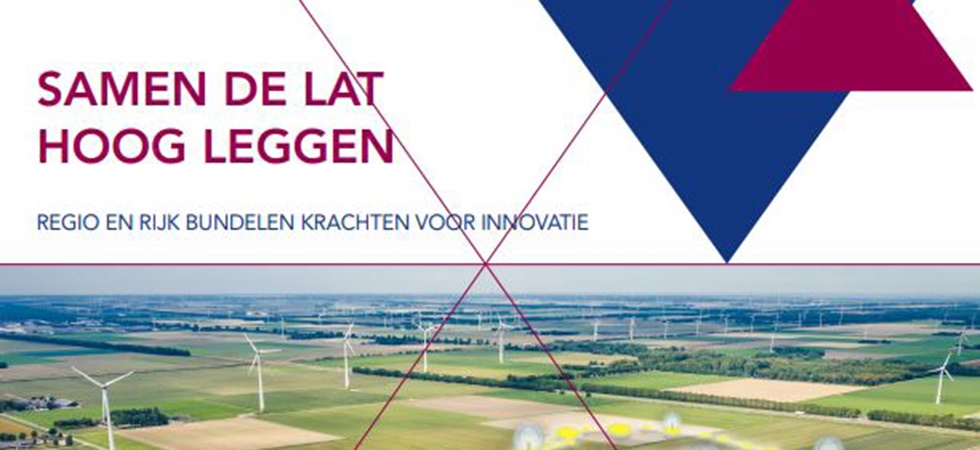In its report "Raising the bar together," the Advisory Council for Science, Technology and Innovation (AWTI) this week advised on even better joining forces between the state and the region for more innovation.
As AWTI board member Koenraad Debackere states in the accompanying press release, "The regions and the national government share responsibility for stimulating innovation. Innovation is needed to renew the economy, to improve our broad welfare and to make progress in the major transitions in areas such as energy, food and digitalization. State and region must join forces for the future of the Netherlands."
"As joint regional development companies (ROMs), we see this report as confirmation of the path of intensified supra-regional cooperation and more commitment to regional ecosystems for research and innovation," said Dina Boonstra (director NOM). "The recognition that all regions are crucial to the innovation strength of the Netherlands is of great importance to us in this regard."
Importance of regional ecosystems emphasized
It happens in the region, writes the AWTI. That is where companies, scientists, talent and social organizations find each other, where new initiatives arise and where there are opportunities for renewal and innovation. With the help of regional factors - capital, knowledge, infrastructure, facilities, rules, networks and market - parties develop initiatives that contribute to the innovation and competitiveness of the ecosystem. Concrete innovation projects, as well as joint living labs, campus development, shared learning and workshops, and coaching and financial support for the regional business community. Regional ecosystems flourish where parties work together on research and innovation every day.
An ecosystem becomes even stronger when it makes connections with others. That leads to greater impact, nationally and internationally, and avoids overlap, fragmentation and awkward competition. More connection between regions makes them strengthen their own innovative capacity, learn from each other and contribute better to the whole.
"The joint ROMs have strong cooperation among themselves. The arrival of the ROM North Holland in the middle of this year will create a nationwide network of development companies and even more room for supra-regional cooperation. The ROMs' core activities are focused on strengthening ecosystems. This report touches the heart of the ROMs and together we are happy to take up this gauntlet together with our national and regional partners," said Wendy de Jong (director Oost NL).
More investment in regional innovation desired
For regional ecosystems to really come to fruition, a change is needed in how national and regional government work together as equal partners. Collaboration new style must give direction to regional innovation, pay attention to region-specific challenges, ensure better alignment between regional and national innovation goals, and create stronger connections between relevant regional innovation efforts.
"That requires a lot of knowledge, expertise and resources. That's why the state must participate and work better with the regions." (Nienke Meijer, AWTI).
The AWTI recommends that the national government provide multi-year, programmatic investments for the development of regional ecosystems. Currently, there is still too much temporary impulse funding and an imbalance in available resources between different regions. Only long-term structural funding succeeds in creating the right levers between different public and private funding sources at regional, national and European levels. With a smart combination of both grants and investment resources, for example, shared facilities on innovation campuses can be financed.
"The AWTI's suggestion to support regional ecosystems with long-term, programmatic funding, and to give the joint ROMs a central role in this, is of course very interesting. We would like to think along with the new cabinet about how this could possibly be shaped," said Brigit van Dijk - Van de Reijt (director BOM).
Exploit even better the power of ROMs
The AWTI argues that it is time to further empower regional development corporations to play a key role in regional innovation. By providing support not only to the regional innovative frontrunners but also to the broader SME peloton seeking to grow through innovation, investment and internationalization. Broadening the ROMs' role to innovation-following SMEs has also recently been advocated by VNO/NCW and MKB-NL.
In this way the ROMs, or regional innovation centers as the AWTI calls them, form the links between the regional business community, universities, universities of applied sciences, senior secondary vocational education, other knowledge institutions, economic boards, decentralized authorities, the state, other financiers and relevant European networks and clusters. They thus implement the generic, national policy for SMEs and ensure a strong region-specific embedding. By strengthening their position, the ROMs can show regional business even better the way to national instruments and funds and opportunities in European programs. This further development of the ROMs requires a more active role from the Ministry of Economic Affairs, in coordination with other shareholders, and also more capacity at the ROMs, according to the AWTI.
"The outlined future picture for the ROMs is exactly where our ambitions lie. Close to the entrepreneur, more support for innovation-following SMEs, strongly regionally anchored but at the same time well connected to national and European developments and cooperating supra-regionally where opportunities lie. The report shows very well that we are the independent and expert party for this but still need more clout to properly fulfill this role," says Rinke Zonneveld (Director InnovationQuarter and Chairman Regional Development Companies Netherlands).

